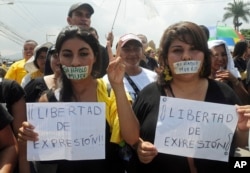Arzu Geybullayeva was a correspondent for Agos, an Armenian bilingual weekly newspaper published in Istanbul, in 2014 when she faced an ugly campaign from the Azerbaijani government to hurt her credibility with the Azerbaijani people.
Authorities called her a traitor because the government was not happy with her critical reporting.
"I was doing a lot of work with Armenians at the time,” she said. “I was co-directing a small not-for-profit organization that did dialogue programs between Armenians and Azerbaijanis. But the funny thing is, when I was called a traitor and they made an enemy of the state out of me, they never mentioned anything about my critical reporting. They always mentioned my Armenian link and how I was writing for an Armenian paper in Istanbul … and I was selling government secrets."
This, Geybullayeva said, is still a very common method to discredit journalists in Azerbaijan.
"It's the easiest way to get public support, because we are in a war with Armenia and there are a lot of people who are fed propaganda," she added.
Shared stories by female journalists
Her story is included in a new book released by the Committee to Protect Journalists, or CPJ. It brings together essays from female journalists who shared stories about the threats and online abuse they faced while reporting.
For the launching of CPJ's annual Attacks on the Press, a panel discussion was held at the Newseum in Washington, D.C., where four journalists told their stories of sexual violence, online harassment and gender-based discrimination.
CPJ Board Chair Sandy Rowe said this edition is a "different approach" because the committee decided to focus on the intersection of gender and press freedom.
The need for a book like this, Rowe said, became apparent five years ago when Lara Logan, a CBS correspondent, was sexually assaulted while covering Arab Spring protests in Egypt.
"Five years later, I can tell you that the landscape is better in some ways, and in some ways, it's worse," Rowe said.
Although words can change the world, Rowe said, they can also do "tremendous harm." She points to the damage caused by internet trolls who target female reporters for abuse that includes threats of physical and sexual violence.
“I think online, definitely we’ve seen time and time again that women are subject to so much more verbal abuse online as a foreign correspondent," said Molly McCluskey, a freelance foreign correspondent.
McCluskey said she has been harassed online even for neutral stories such as those that give financial advice.
"I’ve written some personal finance articles about paying down student debt or how to save for a mortgage that I’ve had some really vicious comments in them," she said.
According to CPJ, platforms like Twitter allow anonymity or pseudo-anonymity for predators while Facebook prohibits anonymity, or makes it more difficult.
The women suggested solutions to resolve some of these issues, such as having managers in the newsroom who can offer better support, or even a policy change that could address online anonymity.
Assaulted and beaten
Logan, who attended the discussion, said she knew her story needed to be told. The CBS correspondent endured at least 25 minutes of brutal sexual assault and beating by a mob the day Egyptian ruler Hosni Mubarak stepped down from power.
An Egyptian doctor who treated her after she was safely taken to a hotel refused to listen to what had happened at Cairo's Tahrir Square.
"I wanted to tell him what happened to me, and he didn't want to know [be]cause that was more than he could process. And he just kept saying to me, ‘Stop talking; you're lucky to be alive,' " she said.
No one would look at her. No one would talk to her. At that moment, she said, "I felt like I disappeared."





